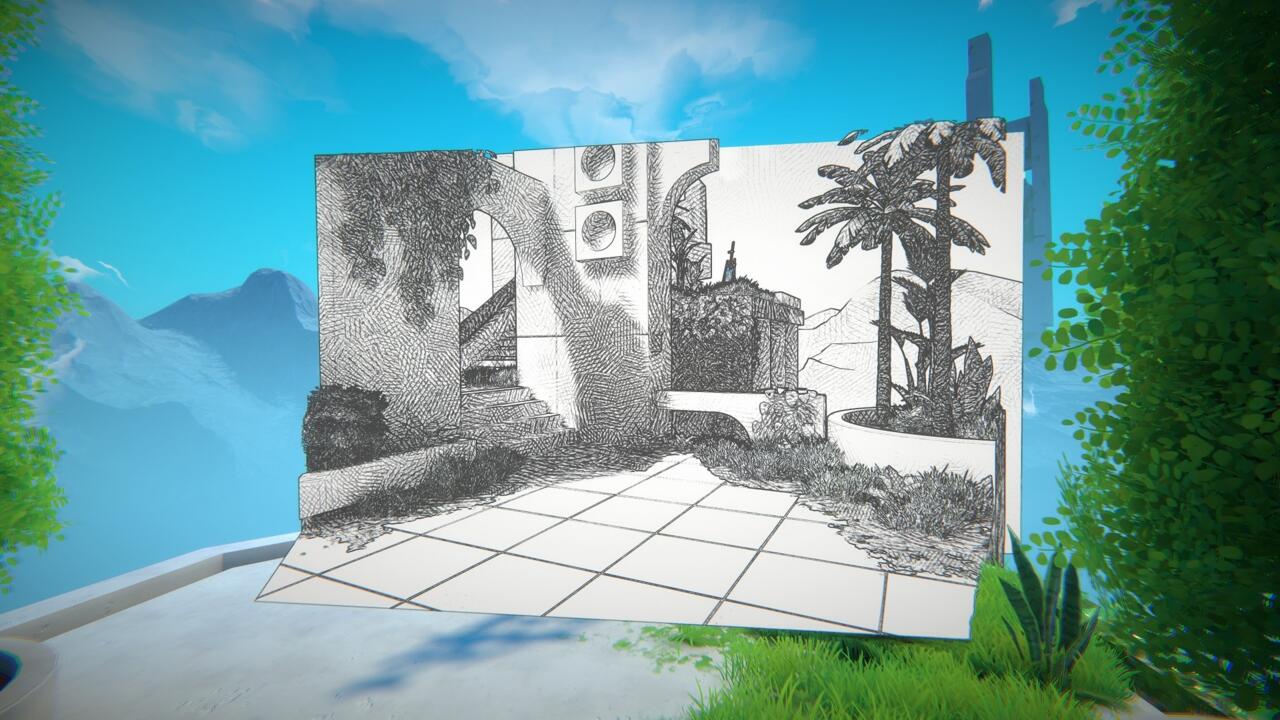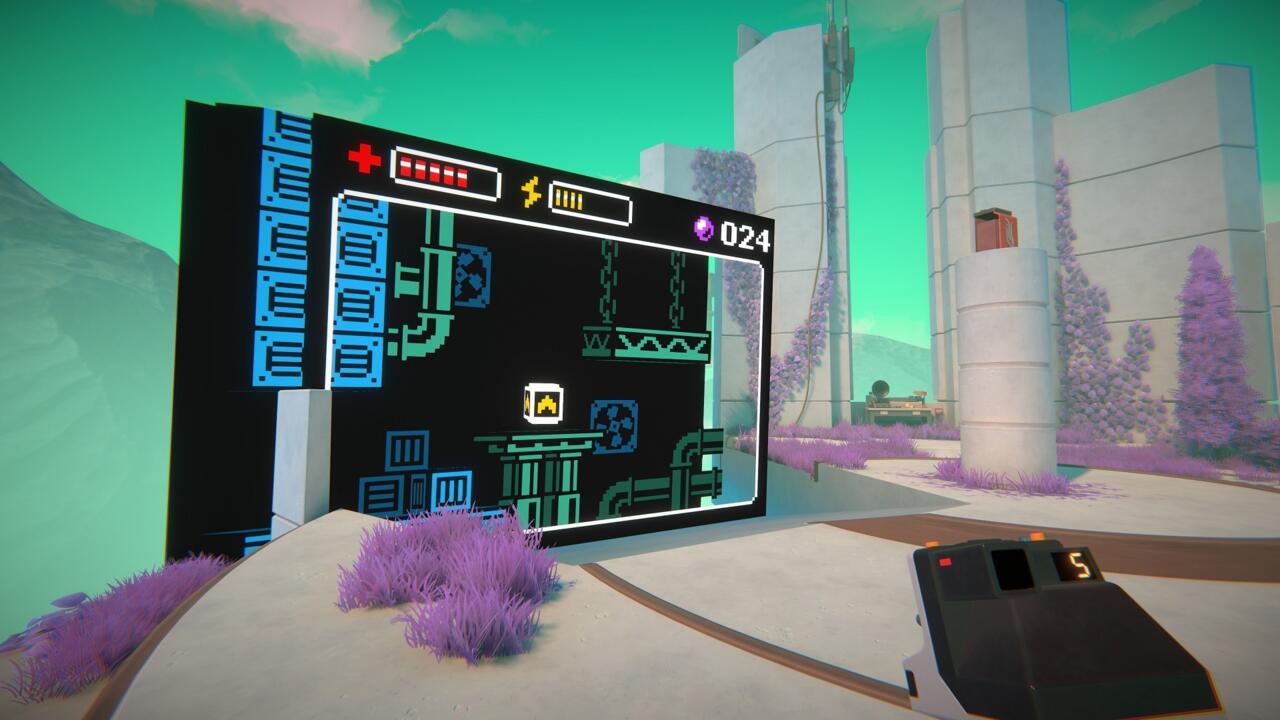Some of the most well-designed puzzle games are also some of the easiest to understand at a glance. Portal, for all its devious experiment rooms and conundrums within, is simple to break down and explain to new players, letting its depth reveal itself as you use its mechanics in increasingly complex ways. Baba is You is equally straightforward but can get wildly chaotic when you start truly experimenting with how far you can stretch its word-based combinations. Viewfinder neatly fits into their company. It's a short but engrossing puzzle game with a distinct and captivating central mechanic that is satisfyingly explored across a range of challenging puzzles, each of which left a grin on my face upon arriving at a solution.
Viewfinder's core concept lets you take static, 2D images and project them into 3D space in the world around you. For example, a Polaroid shot of an otherwise unassuming staircase can be used to construct a new path to a higher platform once projected into the world, carving out space for itself and destroying anything that might have been there beforehand. The more you play around with it, the more you start understanding different facets of how this power can be used to manipulate the serene and delightfully colorful environments around you. For example, while a picture of a plain wall might only show you what was captured in two dimensions, the effect it has once you apply it to the world is much more, sometimes throwing out whole rooms and important objects from behind it. By the same token, where you place your projections is equally important, too, as large structures that you conjure ahead of you can inadvertently shear the environment in such a way that makes reaching your objective more challenging.

Viewfinder starts slowly by only offering you predefined photos that you can find around stages, easing you into the mindset that will be required by later challenges. However, it's not long before it truly lets loose by giving you a camera of your own, letting you capture stills from any angle in a stage and use them to devise your own solutions. This moment feels empowering and liberating, akin to finally being able to fire both portal types in Portal after being forced to solve puzzles with only one. It also comes at just the right time, where the complexity presented by puzzles that give you the exact tools you need to solve them is beginning to wear thin. Without the safety net of being given the pieces you need for a solution and challenging you to find them yourself, Viewfinder entrusts you to create your own solutions that can be as straightforward or wholly unique to the way you deconstruct a problem.
The aim of each stage is to reach a teleporter at the end of it, with some obstacles thrown in to keep that from being simple. Sometimes the teleporter needs to be powered by multiple batteries in a level where there might only be one, challenging you to figure out not only how to get them to the right place but also how to conjure duplicates without running out of film. Other times, the teleporter is powered by a network of wires, which can easily be severed if you're reckless with where you project pictures. These networks can be powered by sound or pressure plates, other times holding charge in batteries to give you time to get to a teleporter before it shuts back down. Each of these pieces is presented simply at first but quickly combine together to keep you thinking about how each individual solution can make up a grander, more involved one, often requiring a new revelation about the nature of the core mechanic and how it can work in alternative ways.
The concept of capturing a moment is stretched in fascinating ways, pushing you to think not just about the physical attributes you're capturing in each picture but also what state in time they're in. A battery photographed at full charge will retain that when reused in the world, creating opportunities for you to reach what it might be powering without physically having to walk as far to reach it. Viewfinder uses this as a central theme in a string of puzzles, but then quickly builds upon it, incorporating what you've just learned in a more complex puzzle while introducing an entirely new theme for subsequent ones to follow. It keeps the sense of discovery strong and makes each victory feel like one triumph over an impossible problem after another, especially when considering how intricate puzzles become by the end. The way in which Viewfinder can consistently keep this going is revelatory but also is afforded by its relatively brief length at just around four hours for completion. There's just a handful of optional (and truly challenging) stages to tackle and collectibles to find, but Viewfinder can easily be completed in a single sitting, and might be best experienced in that way, too.
While each string of puzzles is consistently engrossing to solve, the story that wraps everything together is a little less so. Most of Viewfinder takes place in a simulation, seemingly happened upon by two young researchers looking for a device to help save their current climate from crisis. The simulation was created by some genius engineers as a way to continue working outside of the constraints of time, inviting some introspective ideas about the pursuit of perfection if given the space to do so.

Your journey through this simulation is guided by Cait, an artificial intelligence that takes the form of an adorable cat. Aside from the disembodied voice you hear occasionally from your handler in the real world, Cait is the only other character you'll interact with. This isn't an issue, though, given how supportive and encouraging he is as you progress swiftly through each puzzle. But Cait harbors a growing sadness as you approach the end, dissuading you from reaching it in the hopes that he won't be abandoned again. It makes your eventual farewell a poignant moment, emphasizing how strong an impression he made in such a short amount of time.
As you venture from one hub to the next, you start getting a better idea about the people who built this place and slowly start piecing together why their pursuit to save the planet might have been in vain, although you'll miss most of this context if you don't take time to read the numerous sticky notes and item descriptions around each level. Even with that, Viewfinder's story lacks the impact that its narrative is seeking, making its eventual conclusion land without any sense of emotion. Aside from Cait, there's no other characters that made enough of an impression to be memorable, which is disappointing given how interesting of a world they constructed for you to play around in.
Despite an unsatisfying narrative, the bulk of Viewfinder is spent solving a variety of unique puzzles, and it's here where it never falters. The numerous ways in which Viewfinder manages to stretch its core idea consistently kept me entranced, providing a deeply satisfying loop of deciphering a conundrum and constructing a solution that could be distinct to my playthrough. Given how Viewfinder quickly empowers you with the tools to create your own solutions while challenging you to push your understanding of its world, it's pleasantly surprising how frictionless the entire experience is, never once devolving into tedium or frustration. Viewfinder finds elegance in simplicity but doesn't trade this for straightforward solutions, making it one of the best puzzle games you can play today.
























